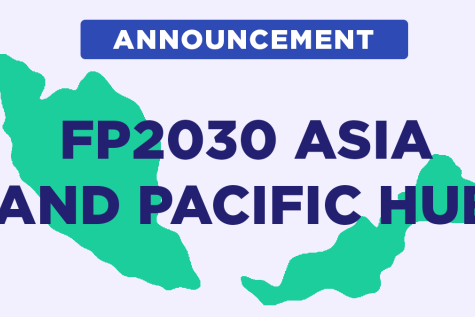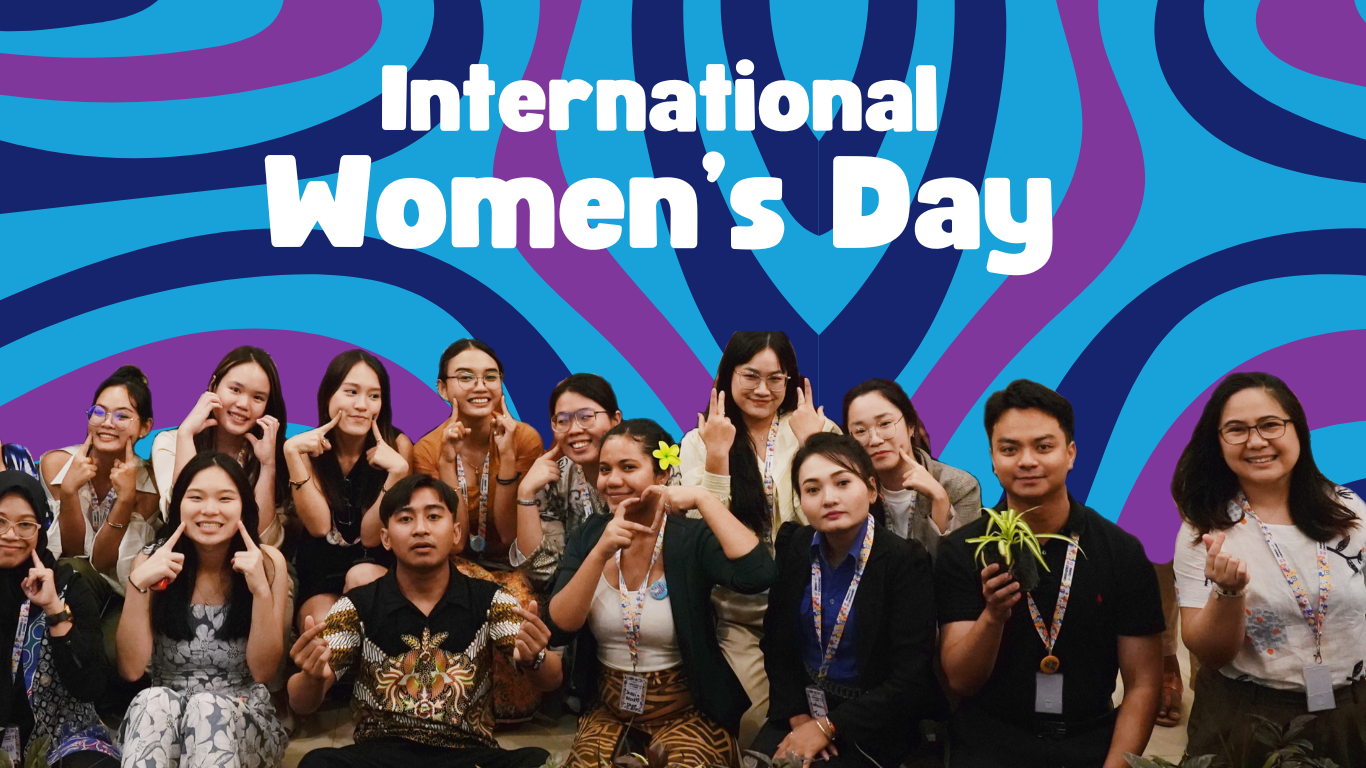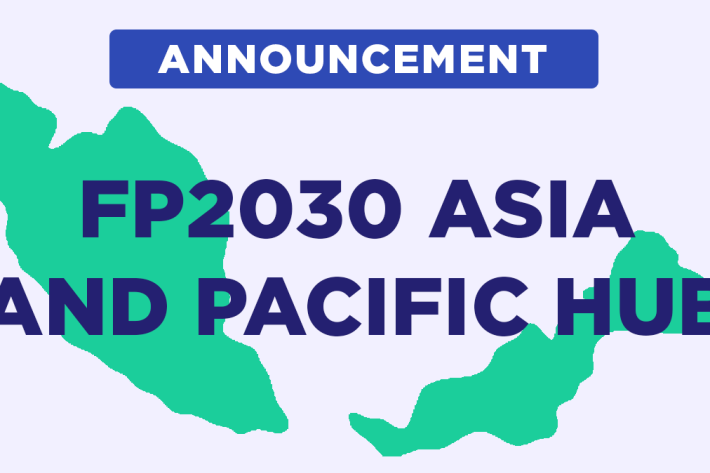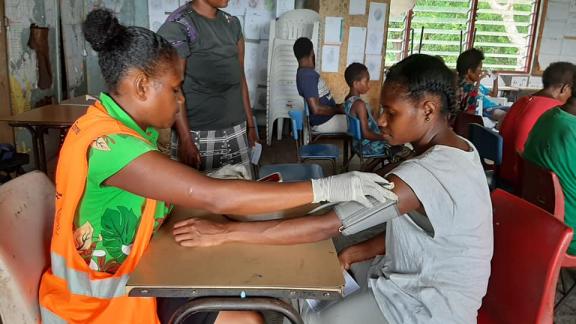
Spotlight
A selection of news from across the Federation

IPPF-ESEAOR TO HOST FP2030 ASIA-PACIFIC HUB
IPPF-ESEAOR will serve as the host of FP2030 Asia Pacific Regional Hub starting this year. This is the fourth FP2030 Regional Hub, preceded by the North America and Europe Hub in Washington DC, the East and Southern Africa Hub in Nairobi, Kenya, and the North, West and Central Africa Hub in Abuja, Nigeria. This is part of the ongoing transition of FP2030 - from a single secretariat office in the United States and now to a global support structure and presence.
Filter our news by:


| 26 July 2024
Empowering Media Professionals to Address Reproductive Justice and Human Rights
The Asia Pacific Institute for Broadcasting Development (AIBD) and the International Planned Parenthood Federation, East, Southeast Asia, and Oceania Region (IPPF ESEAOR) jointly organised a comprehensive media training programme focused on content creation for impactful reporting on Reproductive Justice and Human Rights. The three-day virtual training, which took place from July 23 to 25, brought together 45 media professionals from 17 countries across the region, including Malaysia, Indonesia, Myanmar, Vietnam, Fiji, Vanuatu, Papua New Guinea, India and Pakistan. The training programme tackled several objectives to empower media professionals across the Asia-Pacific region. Emphasis was placed on promoting ethical media coverage, creating valuable resources, and fostering a network of journalists dedicated to developing a comprehensive guide and producing diverse content on multiple platforms, including news articles, in-depth human-interest pieces, videos, and documentaries on television or radio segments. “The rise of disinformation and anti-rights movements threatens media integrity, democracy, and reproductive justice, impacting marginalised communities. This initiative, a collaboration between AIBD and IPPF ESEAOR, aims to equip participants with the skills to address these challenges and enhance media coverage and public awareness of these critical issues, leading to more informed and nuanced reporting,” said Tomoko Fukuda, IPPF ESEAOR Regional Director. Recent pre-training survey results highlighted several critical areas for development among media practitioners in the Asia-Pacific region. 76% of respondents emphasised the importance of staying updated on regional reproductive health and rights developments. Additionally, 83% sought better tools and strategies to combat disinformation, while 69% expressed strong interest in solutions journalism to highlight successful initiatives and positive stories. 70% of participants identified the need to understand better and report on legal frameworks and their socio-economic impacts on marginalised communities. 72% showed a keen interest in learning new narrative-building and framing techniques to better engage their audiences on reproductive health and human rights issues. Over three days, the programme covered ten sessions designed to tackle key challenges and enhance media professionals' skills through case studies, group discussions, and insights into identifying and countering disinformation. Participants explored current narratives surrounding reproductive health and human rights while gaining crucial insights into the influence of opposition groups and anti-rights movements on policies and advocacy. "Framing content from a human rights angle or as a public health concern can significantly boost public understanding and engagement, particularly on social media. This approach highlights the media's crucial role in driving meaningful conversations," said Allan Colinares Francisco, PTV News Philippines. "I have limited experience in covering sexual and reproductive health and rights, so the information-packed sessions were incredibly valuable. I’m now motivated to tackle key issues affecting young people, like menstrual health, hygiene, and comprehensive sexuality education (CSE), to ensure they get the accurate information they need,” said Happy Indah Goeritman, news anchor and assistant producer at TVRI Indonesia. Jamel Suleman, communications associate at the Department of Information, Fiji, shared a similar sentiment: "I'm keen to develop articles on contraceptive use, analysing the cultural context, accessibility, and socio-economic impacts, particularly the effects of COVID-19. By interviewing local health experts, women's rights organisations, and community members, I aim to provide a comprehensive understanding of these aspects.” Participants presented their content ideas for potential production during a dynamic pitching exercise that wrapped up the training. In this final activity, they showcased innovative strategies and concepts to enhance media coverage of reproductive justice and human rights by applying the insights gained throughout the training. Dr Dipendra Kumar Mazumder, National Academy of Broadcasting and Multimedia (NABM), India, shared his ideas during the final session: "With my extensive experience as an editor and news producer, I believe that connecting SRHR topics to broader societal impacts is particularly valuable. Connecting global issues with local context is crucial, especially as broadcasters drive change towards Sustainable Development Goals (SDGs)." In his closing remarks, Gessen Rocas, External Relations Director, IPPF ESEAOR, emphasised, “Moving forward, we hope the vibrant network of media practitioners formed during this training will be leveraged for ongoing collaboration and support, which will be instrumental in promoting human rights.” The next phase of this collaboration will feature an in-person training in Kuala Lumpur, held in conjunction with the Asia Media Summit (AMS), an annual international media conference drawing around 500 global broadcasters, decision-makers, media professionals, scholars, and stakeholders. In addition to plenary sessions and pre-summit workshops, the AMS provides a platform for intergovernmental dialogues to elevate the standards of the regional media industry. Addressing reproductive justice and human rights will be critical, ensuring these vital issues are effectively covered and reported. For more information, contact: Malarvili Meganathan, Regional Communications, Voice & Media Advisor, East, Southeast Asia and Oceania Region [email protected]

| 02 June 2024
Redefining Media Activism: A Gender Progressive Shift
A recent panel discussion at the University of Malaya, Kuala Lumpur, titled “A Gender Progressive Approach to Understanding the Fallacies of Performative Media Activism,” brought together prominent voices in media and gender advocacy. Organised by the postgraduate students of the Gender Studies Programme, the event featured Malarvili Meganathan, Regional Communications, Voice, and Media Advisor at IPPF ESEAOR; Abinaya Dhivya Mohan, Advocacy Director at Women’s Aid Organisation; Sabrina Aripen, PhD student and founder of the Society for Equality, Respect, and Trust for All (SERATA); and songwriter Takahara Suiko. The discussion explored performative activism in the media and feminist movements. Panellists addressed the challenges of media inclusivity and representation, examining the role of privilege in shaping these discussions. Gender-Progressive Media The discussion emphasised the need for gender-progressive media to go beyond performative gestures, advocating for inclusive and meaningful representation of all genders in authentic ways that contribute to substantive cultural shifts. Currently, gender representation in media is skewed towards men and prominently features gender stereotypes. Globally, women comprise only 24% of the people who have heard, read about, or seen in newspapers, television, and radio news. Over 46% of news stories reinforce gender stereotypes, while only 4% of stories challenge them despite an increase in coverage over the past five years. Underrepresentation varies significantly in local contexts, affecting LGBTQIA+ individuals, women of colour, Indigenous women, migrants, and refugees. In the Asia Pacific region, gender inequality and power imbalances persist, limiting women’s agency to exercise choice. Activism and Media Literacy The panel also discussed effective activism strategies for engaging and mobilising diverse audiences to foster allyship and collective action. Media literacy was highlighted as a crucial tool in empowering audiences to analyse representations of gender and race in the media critically. Solution journalism was emphasised to address challenges alongside evidence-based responses. This approach reimagines focus, frame, and narrative, contributing to a more inclusive and equitable media landscape. According to the latest Journalism, media, and technology trends for 2024 by the Reuters Institute for the Study of Journalism, publishers prioritise more precise explanations of complex stories, solutions-oriented storytelling, and inspirational stories to counter news avoidance and fatigue and maintain interest. Perspectives on Media Representation and Gender Justice Dr Rusaslina Idrus, Senior Lecturer at the Department of Gender Studies, Faculty of Arts and Social Sciences, University of Malaya: "It is crucial for young women to see themselves represented in the media. Diversity is vital. We must create spaces for marginalised communities and platform activists and address economic barriers affecting Indigenous communities. This includes tailoring messaging to be culturally relevant, particularly in areas like reproductive health and rights, by collaborating closely with community leaders. Abinaya Dhivya Mohan, Advocacy Director, Women’s Aid Organisation: "To promote gender justice, it's essential to tell the stories of survivors in a dignified, rights-based manner and make media more accessible to people with disability. Gender-progressive media should prioritise these aspects. Media organisations should hire more women in decision-making positions and institute policies that protect women from harassment and violence.” Lauren Brodie Tsen, Research Assistant, Postgraduate student, Department of Gender Studies, Faculty of Arts and Social Sciences, University of Malaya: "In Nabawan, one of the poorest districts in Malaysia, pregnant women struggle to access life-saving services due to inadequate infrastructure. Media activism must address the rights and needs of those on the fringes, particularly women and girls deprived of essential healthcare services and protection against sexual and gender-based violence.” Moderated by Nadirah Babji, Senior Humanitarian Program Officer at IPPF ESEAOR, the event concluded with valuable insights into gender-progressive media practices. The discussion emphasised moving beyond performative activism, ensuring meaningful representation and leadership from communities on the ground, and the need for coherent policies at all levels, starting with national media policies.

| 11 March 2024
Equality Now: Youth Leaders Call for Reproductive Justice Across Asia Pacific
The Youth Sexual and Reproductive Health and Rights (SRHR) Network in East & Southeast Asia and the Pacific (YSNAP) organised a virtual panel discussion to mark International Women's Day under the theme of 'Inspire Inclusion', featuring participation by young advocates and leaders from across the region. The dialogue centred on ensuring equitable access to youth-friendly sexual and reproductive health (SRH) services and addressing the complex intersections of poverty, reproductive health, and justice. The Asia Pacific region, home to more than 60% of the global youth, stands at a crucial juncture. A significant barrier to achieving gender equality by 2030 is the alarming lack of investment in initiatives aimed at addressing discrimination and ensuring equal access to education and healthcare. Recognising the importance of investing in women goes beyond economic benefits; it is a fundamental human rights issue crucial for fostering inclusive societies. The COVID-19 pandemic, geopolitical conflicts, climate disasters, and economic instability have collectively pushed an additional 75 million people into poverty since 2020. Without urgent action, it is projected that more than 342 million women and girls will fall below the poverty line by 2030, further widening the gap in accessible sexual and reproductive rights and health. The International Planned Parenthood Federation’s (IPPF) 'Come Together - Strategic Plan 2028' is a comprehensive blueprint for supporting young people in realising their Sexual and Reproductive Health and Rights (SRHR). The strategy emphasises 'youth-led' and 'youth-centred' programming, recognising the importance of empowering young people to have control over all aspects of their sexual and reproductive health. This approach is crucial for walking shoulder to shoulder with young people and communities facing stigma and prejudice. The panel discussion, moderated by Ashleigh Mar-Chang, Vice Chairperson of YSNAP, was enriched by insights from youth leaders across the region, emphasising the importance of inclusivity, engaging men and boys in gender equality, and including young people in decision-making processes for meaningful change. Inspiring Inclusivity: Creating Safe and Accessible Spaces Aarefa Shiraz, a youth networker from IPPF South Asia, emphasised the critical role of inclusivity in sexual and reproductive health and rights (SRHR). She said inclusivity means that safe spaces in healthcare settings respect young individuals' autonomy and offer non-judgmental support. She envisions a future where inclusivity is intersectional, ensuring that every voice is heard and everyone is treated with respect and dignity. She highlighted the importance of young people freely expressing their individuality and sexuality, acknowledging the long history of women battling patriarchy and misogyny to achieve recognition and equal compensation for their work. Despite significant progress since the fight for women's rights to vote, she notes that much work remains to ensure that women and young people can safely express their identities and are compensated equally for their work, comparable to their male counterparts. Engaging Men and Boys for Gender Equality Ly Teang Cheng, Project Coordinator of the Cambodia Men’s Network Program, discussed the critical role of men and boys in advancing gender equality. By challenging gender stereotypes and addressing toxic masculinity, he emphasised the need for societal change that includes men and boys as allies. This approach involves community engagement, advocacy, and capacity building to foster a more inclusive society. It also includes mobilising intergenerational support from fathers, grandfathers, and youth on topics of intersectionality and sexual and gender-based violence. The importance of men as allies cannot be overstated; their involvement is crucial in dismantling systemic barriers to equality and promoting a culture of respect and understanding across genders. Including Young People in Decision-Making Fa’atauva’a Sale (Ashlie), Youth Support Secretary at the Samoa Family Health Association (SFHA), emphasised the importance of including young people in policy and decision-making processes to create meaningful change, empowering them to actively participate in their communities and promote a sense of ownership. She highlighted the critical need to address the stigma surrounding SRHR conversations and discrimination, particularly in Samoa and across the Pacific. Tackling these issues is essential for fostering an environment where young people feel safe and supported in seeking information and services related to their sexual and reproductive health. Additionally, Grace Aumua, the youth focal person at SFHA, underscored the importance of treating youth with respect and kindness, actively encouraging diverse perspectives. The International Women's Day panel discussion served as a powerful platform to address the challenges and achievements in women's health and rights. The virtual event underscored the collective effort required to advance SRHR in the Asia Pacific region and beyond by focusing on inclusivity, engaging diverse stakeholders, and empowering young voices. For more information, contact: Malarvili Meganathan, Regional Communications, Voice & Media Advisor, East, Southeast Asia and Oceania Region [email protected]

| 11 November 2023
Empowering Content Creators in Low-Resource Settings Through Community-Driven Strategies in Asia Pacific
The Asia-Pacific Digital Sexuality Education Bootcamp for Content Creators (DESIRE Bootcamp 2023) brought together 96 participants from the region, including educators and advocates. Organised by UNFPA Asia-Pacific Regional Office and UNFPA Indonesia, the event aimed to foster partnerships and promote collective learning. The bootcamp provided content creators with the tools needed to positively impact Adolescent and Youth Sexual and Reproductive Health (AYSRH) in the region through sessions held on November 4th, 5th, and 11th. The first session, led by IPPF ESEAOR, addressed challenges faced by marginalised youth and underscored community-driven solutions. In his opening remarks, Pio Smith, Regional Director, UNFPA Asia and the Pacific Office, emphasised the importance of harnessing the ever-evolving digital landscape. “In today's world, where youth are gaining unprecedented access to technology, we must leverage digital spaces to deliver accurate, non-discriminatory, age-appropriate information. Our goal transcends borders, demographics and backgrounds,” he said. Navigating the Challenges Malarvili Meganathan, Regional Communications, Voice, and Media Advisor at IPPF ESEAOR, highlighted the critical nature of addressing vital issues in low-resource settings. One key takeaway from the talk revolved around recognising the challenges faced by marginalised and underserved youths, particularly concerning access to adolescent and youth sexual and reproductive health information and services. Understanding these challenges deeply emerged as a crucial step toward developing effective strategies for their resolution or mitigation, emphasising adopting a community-driven approach. Transitioning to access to education and information in the region, a report by UNFPA, UNESCO, and IPPF revealed that many young people prefer to obtain information from the internet and peers rather than relying solely on school-based education. This shift in information sources highlights the need for inclusive digital education to ensure marginalised populations, such as LGBTQIA+ individuals, refugees, migrants, people with disabilities, and indigenous communities, are not left behind in the educational framework of numerous countries. Innovative Approaches to Bridging Gaps: Community-Driven Strategies The session proposed actionable strategies to address the challenges collaboratively, including peer education programs, stakeholder collaborations, and policymakers' engagement to prioritise sexual education and digital access in low-resource settings. Best practices encompassed those implemented by IPPF Member Associations and implementing partners, which involved collaboration with community members, consultation with village representatives in hard-to-reach areas, communication materials in local languages, utilisation of community radios, establishment of public-private partnerships, hands-on training in content editing, and outreach sessions with young people in Cambodia, Laos, Philippines, Fiji and the Solomon Islands. Zaira Mendez, Social Media Manager at the Family Planning Organization of the Philippines (FPOP), led a hands-on session to develop innovative methods for creating digital sexuality education content in low-resource settings, drawing inspiration from FPOP's success in engaging young people, especially in Geographically Isolated and Disadvantaged Areas (GIDA) supported by the Australian government-funded RESPOND project. These areas include hard-to-reach communities, both geographically and socially, due to uneven socio-economic development. In the interactive session, participants explored various content creation strategies tailored to the unique needs and challenges of these communities. They brainstormed ideas for informative videos, infographics, and quizzes, effectively conveying essential sexual education information. These efforts aim to empower young people with accurate knowledge, enabling them to make informed decisions about their sexual and reproductive health. The session concluded on a high note, with participants demonstrating their strong commitment to positively impacting digital sexuality education. This commitment sets the stage for future partnerships and collaborations to strengthen content creation in the Asia-Pacific region, ensuring equitable access to essential sexual and reproductive health information for all.

| 17 January 2023
IPPF welcomes new Executive Director for Planned Parenthood Association Thailand (PPAT)
Planned Parenthood Association Thailand (PPAT) has a new Executive Director! Please join us in welcoming Dr. Nanthakan Sungsuman Woodham into the IPPF and PPAT families. Dr. Woodham has been associated with PPAT since 2019, in multiple capacities, including Deputy Executive Director. Dr. Woodham will continue to promote the values and principles of PPAT and continue to strengthen relationships with the government, partners, non-government organisations, and the public and private sectors. We are excited and we look forward to continuously work with Dr. Woodham in advancing sexual and reproductive health and rights in Thailand!

| 16 January 2023
Celebrating 30th anniversary of VINAFPA in Vietnam
The Vietnam Family Planning Association (VINAFPA) commemorated its 30th anniversary with a ceremony on January 11, 2023, in Hanoi. More than 250 delegates from different Ministries, students and faculty members from academic institutions, CSOs, factory representatives, print and social media, social activists and volunteers and staff of the Association participated. The association's pivotal role in shaping policy changes in Vietnam on family planning, reproductive health, women's development and rights, and other social issues was emphasised by Dr. Pham Ba Nhat, President of VINAFPA. Through a diverse range of delivery channels, including clinics, mobile units, associated health facilities, and CBDs in 37 branches throughout Vietnam, VINAFPA has made impressive strides in improving access to SRH information, education, and clinical services over the years. A documentary film on 30 years of VINAFPA was also screened during the event. Ms. Tomoko Fukuda, Regional Director, IPPF ESEAOR, commended VINAFPA for its noteworthy efforts in addressing the SRHR of women, men, and young people in Vietnam, especially those from marginalised and underrepresented communities. She emphasised the importance of putting young people at the centre of SRHR programming and extending access to vulnerable groups like LGBTQI people, people with disabilities, indigenous people, and migrants and internally displaced people as well as highlighting the key elements of the IPPF Strategic Framework (2023-28). She continued by explaining that given Vietnam's declining fertility rates and reduced rates of maternal and infant mortality, it is critical that VINAFPA step up its advocacy for SRHR, particularly by ensuring access to contraceptive options and expanding fertility services (including infertility) in accordance with the life cycle approach. The event reached its end with short speeches from partner organisations and representatives of government agencies followed by a photography session to commemorate this day.









